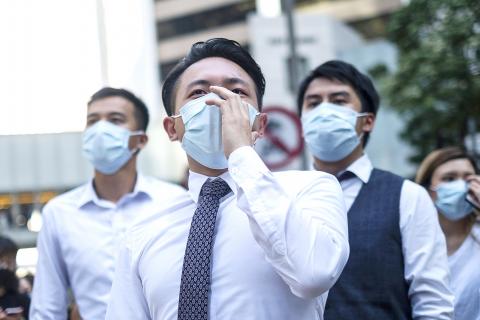Hong Kong invoked emergency powers for the first time in more than half a century to ban face masks for protesters after months of unrest, prompting demonstrators to occupy downtown streets.
Hong Kong Chief Executive Carrie Lam (林鄭月娥) yesterday said the move was necessary to stem increased violence in recent weeks, including attacks by protesters using petrol bombs, corrosive liquids and other weapons.
The prohibition on face masks would deter violence and help police to enforce the law, she said, adding that the measure did not mean Hong Kong was under a state of emergency.

Photo: Bloomberg
As Lam spoke, protesters began gathering in Hong Kong’s Central district and occupying major boulevards.
Shops closed early in anticipation that demonstrations would grow violent, similar to clashes between police and protesters in the past few weeks.
“The violence is destroying Hong Kong,” Lam told reporters, flanked by 16 members of her cabinet. “We must save the present Hong Kong and the future Hong Kong.”
Lam called the situation “fluid” and said the government might consider additional measures if the situation worsened.
“I don’t see how you could relate this to a step closer to authoritarianism,” Lam said in response to a question. “This is a responsible act to deal with an extremely difficult situation, which I hope the world has sympathy.”
The face mask has become a symbol of resistance among protesters who fear retribution if they are identified: China has applied pressure to businesses such as Cathay Pacific Airways Ltd (國泰航空) to fire employees who participate in demonstrations.
The Civil Human Rights Front, which has organized some of the largest protests in the past few months, called the mask ban “dictatorship rule” and said “unspeakable consequences will follow.”
“This is like opening a Pandora’s box — who knows what will come next after this ban?” said one man protesting in central Hong Kong, who only gave his surname Lau. “But the government should know that if it insists, and doesn’t listen to the people, we won’t give up and will keep the government accountable. We will continue our fight.”
The emergency law, first passed by the British government nearly a century ago to quell a seamen’s strike in Hong Kong’s harbor, was last used by the colonial administration to put down riots in 1967.
Denounced by protest leaders, it could give the government greater leeway to arrest citizens, censor publications, shut off communications networks and search premises without warrants, among other measures.
“Put simply, if there’s no escalation of violence, we don’t need to come out with any new measures, but if violence escalates, we need to maintain law and order in Hong Kong, we need to make sure that people can conduct their lives as usual,” Lam said.

INVESTIGATION: The case is the latest instance of a DPP figure being implicated in an espionage network accused of allegedly leaking information to Chinese intelligence Democratic Progressive Party (DPP) member Ho Jen-chieh (何仁傑) was detained and held incommunicado yesterday on suspicion of spying for China during his tenure as assistant to then-minister of foreign affairs Joseph Wu (吳釗燮). The Taipei District Prosecutors’ Office said Ho was implicated during its investigation into alleged spying activities by former Presidential Office consultant Wu Shang-yu (吳尚雨). Prosecutors said there is reason to believe Ho breached the National Security Act (國家安全法) by leaking classified Ministry of Foreign Affairs information to Chinese intelligence. Following interrogation, prosecutors petitioned the Taipei District Court to detain Ho, citing concerns over potential collusion or tampering of evidence. The

‘FORM OF PROTEST’: The German Institute Taipei said it was ‘shocked’ to see Nazi symbolism used in connection with political aims as it condemned the incident Sung Chien-liang (宋建樑), who led efforts to recall Democratic Progressive Party (DPP) Legislator Lee Kun-cheng (李坤城), was released on bail of NT$80,000 yesterday amid an outcry over a Nazi armband he wore to questioning the night before. Sung arrived at the New Taipei City District Prosecutors’ Office for questioning in a recall petition forgery case on Tuesday night wearing a red armband bearing a swastika, carrying a copy of Adolf Hitler’s Mein Kampf and giving a Nazi salute. Sung left the building at 1:15am without the armband and apparently covering the book with a coat. This is a serious international scandal and Chinese

Seventy percent of middle and elementary schools now conduct English classes entirely in English, the Ministry of Education said, as it encourages schools nationwide to adopt this practice Minister of Education (MOE) Cheng Ying-yao (鄭英耀) is scheduled to present a report on the government’s bilingual education policy to the Legislative Yuan’s Education and Culture Committee today. The report would outline strategies aimed at expanding access to education, reducing regional disparities and improving talent cultivation. Implementation of bilingual education policies has varied across local governments, occasionally drawing public criticism. For example, some schools have required teachers of non-English subjects to pass English proficiency

TRADE: The premier pledged safeguards on ‘Made in Taiwan’ labeling, anti-dumping measures and stricter export controls to strengthen its position in trade talks Products labeled “made in Taiwan” must be genuinely made in Taiwan, Premier Cho Jung-tai (卓榮泰) said yesterday, vowing to enforce strict safeguards against “origin laundering” and initiate anti-dumping investigations to prevent China dumping its products in Taiwan. Cho made the remarks in a discussion session with representatives from industries in Kaohsiung. In response to the US government’s recent announcement of “reciprocal” tariffs on its trading partners, President William Lai (賴清德) and Cho last week began a series of consultations with industry leaders nationwide to gather feedback and address concerns. Taiwanese and US officials held a videoconference on Friday evening to discuss the